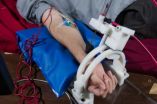(Press-News.org) The repetitive facilitation exercise (RFE) is one of the most common rehabilitation tactics for stroke patients attempting to regain wrist movement. Stroke hemiparesis individuals are not able to move that part of their body because they cannot create a strong enough neural signal that travels from the brain to the wrist.
With RFE, however, patients get a mental boost. They are asked to think about moving. At the same time, a practitioner flexes the wrist. The goal is to send a long latency response from the stretch that arrives in the brain at the exact time the thought happens, creating a neural signal. The result is a strong, combined response that zips back to the forearm muscles and moves the wrist.
It all happens in a span of approximately 40 to 60 milliseconds.
"Timing is everything. When the window is that small, it's not easy for two people to match each other," said Georgia Institute of Technology master's graduate Lauren Lacey.
That's why Lacey and a team of fellow Georgia Tech researchers created mechanical device that takes people out of the process, replacing them with accurate computers. Their functional MRI-compatible hemiparesis rehab device creates a long latency stretch reflex at the exact time as a brain signal.
"It's kind of like trying to fill a bucket with water," explained Minoru Shinohara, an associate professor in Georgia Tech's Human Neuromuscular Physiology Lab. "Stroke individuals can only mentally fill it halfway. The machine pours in the rest to make it full."
So far, the research team has worked only with healthy individuals in their study. Study participants lie on a bed with the arm extended beneath a pneumatic actuator tendon hammer. In order to simulate the weak signal created by hemiparesis individuals to move their wrist, a transcranial magnetic stimulator (TMS) is placed on the heads of these healthy individuals at a 45-degree angle. Milliseconds after the hammer taps the wrist's tendon, the TMS creates a weak signal in the motor cortex. The responses overlap, produce and send a strong signal back to the arm, and the wrist moves.
The team has successfully varied the timing of the TMS signal and speed of the hammer to strike faster or slower depending on how much of a boost is needed to complement the brain signal. Now that the researchers have proven the viability of the TMS-actuator system, they will next work with stroke individuals.
"The device is designed to adapt to people whether they are hyper, normo or hyporeflexive," said Lacey, who graduated in spring with a master's degree from the George Woodruff School of Mechanical Engineering.
Also, because the machine is MRI-compatible, it will allow the team to study what is happening in the brain during rehab, opening the door for robotics.
"Once we fully understand what is happening mentally and physiologically, we should be able to create a robot that can reproduce successful rehabilitative exercises such as RFE," said Jun Ueda, an associate professor in the School of Mechanical Engineering. "It appears that the timing is the critical piece of this exercise. Robots are great at timing, so the results are very promising for robotics."
INFORMATION:
The Georgia Tech team was assisted by researchers at Japan's Kagoshima University, Kazumi Kawahira, Megumi Shimodozono and Yong Yu, who originally performed clinical studies of conventional RFE. The device was presented at the Design of Medical Devices Conference in Minneapolis, Minnesota this spring.
This research was partially supported by the National Science Foundation (NSF) under sub-award EEC 0540834. Any conclusions expressed are those of the principal investigator and may not necessarily represent the official views of the NSF.
Making a mental match: Pairing a mechanical device with stroke patients
2014-07-16
ELSE PRESS RELEASES FROM THIS DATE:
Poor sleep quality linked to lower physical activity in people with PTSD
2014-07-16
DARIEN, IL – A new study shows that worse sleep quality predicts lower physical activity in people with post-traumatic stress disorder (PTSD).
Results show that PTSD was independently associated with worse sleep quality at baseline, and participants with current PTSD at baseline had lower physical activity one year later. Further analysis found that sleep quality completely mediated the relationship between baseline PTSD status and physical activity at the one-year follow-up, providing preliminary evidence that the association of reduced sleep quality with reduced physical ...
MedDiet has varied effects on cognitive decline among different races -- Ben-Gurion University researcher
2014-07-16
BEER-SHEVA, ISRAEL July 16, 2014... While the Mediterranean diet may have broad health benefits, its impact on cognitive decline differs among race-specific populations, according to a new study published in the Journal of Gerontology.
The team of researchers, including Ben-Gurion University of the Negev (BGU Prof. Danit R. Shahar RD, Ph.D, analyzed an NIH/NIA prospective cohort study [Health ABC] conducted over eight years in the U.S. to measure the effects of adherence to a Mediterranean diet. Prof. Shahar is affiliated with the BGU S. Daniel Abraham International Center ...
Chinese researchers describe impaired self-face recognition in those with major depressive disorder
2014-07-16
Neuropsychological impairment has long been established as a fundamental characteristic of depression, but a specific pattern of impairment that is widely recognized has not been summarized. Professor Jia Hongxiao and his group from the Beijing Anding Hospital, Capital Medical University, explore major depressive disorder (MDD) from the perspective of neuropsychology. They found that the self-serving bias and self-recognition bias were impaired in individuals suffering from MDD compared with a control group. This research lays the groundwork for further study on the etiology ...
People in leadership positions may sacrifice privacy for security
2014-07-16
People with higher job status may be more willing to compromise privacy for security reasons and also be more determined to carry out those decisions, according to researchers.
This preoccupation with security may shape policy and decision-making in areas ranging from terrorism to investing, and perhaps cloud other options, said Jens Grossklags, assistant professor of information sciences and technology, Penn State.
"What may get lost in the decision-making process is that one can enhance security without the negative impact on privacy," said Grossklags. "It's more ...
Promising medication counteracts constipation caused by opioid painkillers
2014-07-16
Opioids – strong morphine-based painkillers – are widely prescribed to patients experiencing chronic severe pain. While these drugs are very effective for treating and managing pain, they have one particularly bothersome side effect: constipation. A new drug, called naloxegol, could bring relief. In stage 3 trials reported in the New England Journal of Medicine, KU Leuven and international researchers provide new evidence that the drug relieves constipation without dulling opioids' pain-relieving effects.
Up until a decade ago, physicians rarely prescribed opioids, reserving ...
Bubble wrap serves as sheet of tiny test tubes in resource-limited regions
2014-07-16
Popping the blisters on the bubble wrap might be the most enjoyable thing about moving. But now, scientists propose a more productive way to reuse the popular packing material — as a sheet of small, test tube-like containers for medical and environmental samples. Their report, which shows that analyses can take place right in the bubbles, appears in the ACS journal Analytical Chemistry.
George Whitesides and colleagues explain that although bubble wrap filled with biological samples, like blood or urine, or chemicals would have to be handled carefully, the material offers ...
NIH turns to crowdsourcing to repurpose drugs
2014-07-16
New Rochelle, NY, July 16, 2014–Experimental drugs proven safe but perhaps not sufficiently effective in initial testing or against a first disease target may sit gathering dust on the shelves of pharmaceutical companies. An NIH-sponsored effort based on a crowdsourcing strategy to establish collaborations between industrial and academic partners to test and develop these therapeutic compounds was met with an overwhelming response and has led to clinical testing of a broad range of pilot projects and a newly announced round of funding opportunities. These findings are described ...
What do Google searches tell us about our climate change fears?
2014-07-16
Republicans search the Net for information about the weather, climate change and global warming during extremely hot or cold spells. Democrats Google these terms when they experience changes in the average temperatures. These are some of the surprising findings from a study by Corey Lang of the University of Rhode Island in the US, published in Springer's journal Climatic Change. He tracked how the temperature fluctuations and rainfall that Americans experience daily in their own cities make them scour the Internet in search of information about climate change and global ...
An anti-glare, anti-reflective display for mobile devices?
2014-07-16
If you've ever tried to watch a video on a tablet on a sunny day, you know you have to tilt it at just the right angle to get rid of glare or invest in a special filter. But now scientists are reporting in the journal ACS Applied Materials & Interfaces that they've developed a novel glass surface that reduces both glare and reflection, which continue to plague even the best mobile displays today.
Valerio Pruneri and colleagues note that much effort has been poured into anti-reflective and anti-glare technology. In the highly competitive digital age, any bonus feature ...
Fundamental research is paving the way for development of first vaccine for heart disease
2014-07-16
DETROIT — Researchers at Wayne State University have made a fundamental discovery and, in subsequent collaboration with scientists at La Jolla Institute for Allergy and Immunology (LIAI), are one step closer to the goal of developing the world's first T-cell peptide-based vaccine for heart disease — the number one killer in the nation.
Atherosclerosis is a chronic inflammatory disease of the arterial walls, which thicken due to accumulation of fatty materials such as cholesterols and triglycerides. Blocking of arteries supplying blood to the heart is the underlying cause ...




